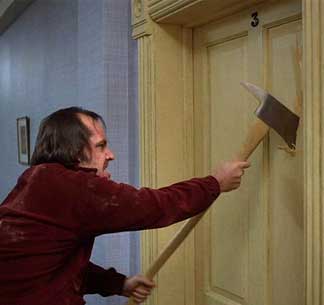 Stanley Kubrick's The Shining is a classic of horror cinema, but it is not Stephen King's The Shining. Stanley Kubrick's The Shining is a classic of horror cinema, but it is not Stephen King's The Shining.
Jack Nicholson is a detraction because he played the role from the start as a potential psycho who quite naturally revealed his true colors, whereas the book had the character quite a decent boob whose madness is unfortunate & sad.
But Kubrick wanted to do something almost absurd. He wanted to create an artistic slasher film, not a Stephen Kingesque "horror romance" about the lives of nice suburban people coping with the unknown.
I loved The Shining when it was new, it seemed so stylish & visually "different." But the camera tricks are now pretty standard & the "style" of the film has become cliche. That makes it easier to tell it didn't have a whole lot else in it, & might reasonably be regarded as "an artful failure."
To say it's a bad film would be a terrible exaggeration; it deserves to be recognized as a classic, but its praises have perhaps been sung a little too highly. The moving camera work in its day was so advanced the film was dazzling -- it will always be historically important. But a portion of the film's praises could be paralleled by mistaking the first color film as fantastically artistic merely because all other films up to then had been in black & white.
Nicholson's over-the-top performance was definitely over-rated at the time, although so often satirized that the truth was also known, that it was played off the Silly Scale. He was hammy rather than scarey & he's done this ham act so often since that I've come to believe his career has been mainly a downhill ride from the heights of Five Easy Pieces (1970), The Last Detail (1973), & One Flew Over the Cuckoo's Nest (1975), to the depths of a fat-assed werewolf role (1994) or a crazy coot who we're supposed to believe could become the One True Love of a woman young enough to be his granddaughter (in About Schmidt, 2002).
The once-great Nicholson has so often stunk on celuloid that he's now only suited to trifling comedies like Meet the Fockers (2004). And the root of his stinkiness seems really to have begun in 1980 with The Shining wherein Kubrick seems intentionally to have exploited Nicholson's capacity to stink.
As for Olive Oil, I mean Shelley Duvall, well, I have always liked her. She did a remarkable job transcending the scream queen archetype. Again, though, the book did not convey a scream queen but a full-bodied character. Because it was Kubrick's intent to make the characters as narrow as in a bad slasher film, & then construct a work of art around these familiar B-film characters, Kubrick's purpose was out of synch with King's purpose.
In King's book Hallorann though hammered to death similar to the way he got axed in the film, he does turn out to be alive & does save the day. But Kubrick makes Hallorann (played by the superb Scatman Crothers) purely the "minority sidekick" type character who in any dramatic, horrific, or action picture, in accordance with a subconscious tradition pervasive in Hollywood, had to be the first to die.
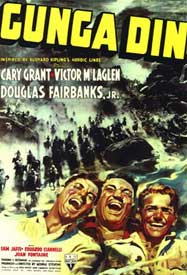 For decades in the movies, nearly all "positive" minorities were like Gunga Din (1939), a bit comical, a bit heroic, completely slavishly devoted to their white pals, with no sense of parity with whites, happy & eager to die so that their white pals can live. For decades in the movies, nearly all "positive" minorities were like Gunga Din (1939), a bit comical, a bit heroic, completely slavishly devoted to their white pals, with no sense of parity with whites, happy & eager to die so that their white pals can live.
With the rise of such amazing action-stars as Wesley Snipes & many to follow, it is now no longer a guarantee that the black character is only supportive & doomed.
In the 1970s & early 80s it was still fundamental that "action circuit" & exploitation films have at least a token minority character because these films sold well in minority neighborhoods, but the central character would still be white, typically sidekick to someone comparatively talentless as an actor, like Chuck Norris.
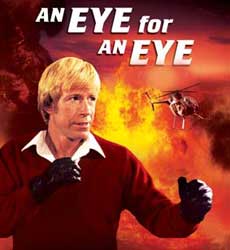 The great character actor Mako got to play an Asian "Stepinfetchit" minority sidekick in a half-baked & half-remembered Chuck Norris film (An Eye for an Eye, 1981), & at least he didn't have to die in that one, but he did waste all his dialogue giving fortune-cookie aphorisms that all began "A warrior is..." The great character actor Mako got to play an Asian "Stepinfetchit" minority sidekick in a half-baked & half-remembered Chuck Norris film (An Eye for an Eye, 1981), & at least he didn't have to die in that one, but he did waste all his dialogue giving fortune-cookie aphorisms that all began "A warrior is..."
I mention him because he got his Academy Award for best supporting actor in The Sand Pebbles (1966) playing one of the most emotionally effective minority-sidekick-must-die characters of all time.
Yet even winning this award he ended up having to pay the rent by being a comedy sidekick to non-actors, & how idiotic that makes Hollywood seem.
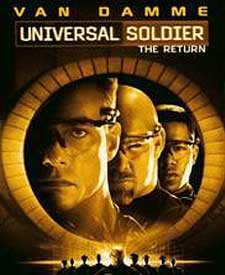 In Wishbone Cutter aka The Shadow of Chikara aka Demon Mountain (1977) the halfbreed Tonto-clone exists primarily to get brutally slain. In Wishbone Cutter aka The Shadow of Chikara aka Demon Mountain (1977) the halfbreed Tonto-clone exists primarily to get brutally slain.
Often having one's minority pal (or as in one of the Rambo films, minority girlfriend) killed in a really mean way adds an extra reason for the white guy to go on a "justified" rampage.
It's an old joke that the ideal action film has at least 200 people graphically slain but the entire main cast survives except for the minority sidekick. This certainly used to be true & is still sometimes true.
The rise of stars like Snipes & Will Smith, & even such dramatic stars as Denzel Washington became an action film star from time to time, has even so not completely done away with the older "use" of minorities in films.
 For instance, in the remake of Friday the 13th (2009), the token black guy is killed almost before the movie begins. In Claude van Damme's Universal Soldier: The Return (1999), the minority sidekick exists primarily to get horribly killed in a boring finale. For instance, in the remake of Friday the 13th (2009), the token black guy is killed almost before the movie begins. In Claude van Damme's Universal Soldier: The Return (1999), the minority sidekick exists primarily to get horribly killed in a boring finale.
Or consider the third-rate comedy-action sci-fi film Evolution (2001), wherein the black comic relief is a throwback to that stock type of whimsically heroic doomed sidekick.
Although in this case he doesn't actually get killed, he does get sucked up an alien's ass, & earlier experiences a comedy rape for white audience amusement. He even acknowledges in one scene, "I've seen this movie before, the black guy dies first." A line lifted from a Robert Townsend film I believe, but I can't recall which.
That was a long digression, but it really is sorry-ass to see a genius like Kubrick doing the same thing to Scatman Crothers in 1980 what George Stevens did to the titular character of Gunga Din in 1939. The only updating improvement would be that in 1939 even the minority was played by a white guy (Sam Jaffe) who dyed himself walnut brown. By comparison to these filmic characters, even with fine directors & actors to bring them to life, the character of Hallorann as King had imagined in the novel in 1970 remains a whole lot more advanced.
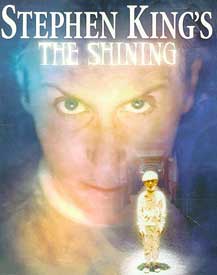 I highlight the sundry faults of Kubrick's artistic failure not to drag a good work down, but to lend some credible basis for Stephen King's longstanding dissatisfaction with the film. For all its faults, The Shining remains an important film, & King seems never to have realized what a mountain he was assaulting when claiming his own televison version of The Shining (1997) had the express purpose of correcting the wrongs he felt Kubrick had prepetrated against his story. I highlight the sundry faults of Kubrick's artistic failure not to drag a good work down, but to lend some credible basis for Stephen King's longstanding dissatisfaction with the film. For all its faults, The Shining remains an important film, & King seems never to have realized what a mountain he was assaulting when claiming his own televison version of The Shining (1997) had the express purpose of correcting the wrongs he felt Kubrick had prepetrated against his story.
The atrocious casting in the new version was alone enough to insure that it would not fulfill its mission, & it must've been embarrassing post-remake to have kvetched so long & so often about Kubrick's version & then end up with something very much inferior to it.
Perhaps if Stephen King hadn't regarded The Shining his first or second best novel (The Stand is better), he wouldn't've been quite so blind to the fact that Kubrick did indeed create a masterpiece-of-its-type, upraising the B "slasher" to a level it hardly seems could ever have been possible considering that the usual epitome of the form was until then thought to be Texas Chainsaw Masacre (1974).ÝI always felt King was foolish not to realize how lucky he'd been to have had, based on any book of his, a film that was more than idly entertaining junkfood. Of all the film adaptations for him to revile, this should've been the last in line rather than first in line.
But it's true the maze hedge that Kubrick inserted into his version of the story was mainly because bringing a topiary garden to life was beyond anyone's budget in those days. I remember the deep disappointment when I was young & that film was new & I saw it in the theater, waiting & waiting for the topiary garden, & got this stupid maze instead -- a scene that would've been great in another film, but it meant leaving out the central weird image of the book & making a Heeeeere's Johnny psychopath the main shtick instead. So I can see how an author might be really disappopinted with this, since I as a viewer was disappointed. Even so, King's unebbing failure to realize it's the best film ever based on a story of his remains peculiar.
Still, it was worth the overlong remake just to finally see the topiary garden bits. As television special effects go, they weren't that awful, a little cartoony perhaps, & I quite enjoyed the show when it first aired. I've never wanted to see it again, but as a one-time experience it was fine. If it hadn't been for King bludgeoning the Kubrick version, King's own production might've seemed very marvelous considering it was only a television film. But by begging for comparisons to Kubrick, Stephen seemed a speck churlish to have always insisted Kubrick's version stank. Whatever was faulty in Kubrick's vision was certainly not redressed in the tv miniseries.
copyright © by Paghat the Ratgirl
|
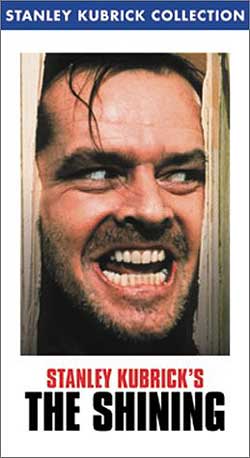


 The great character actor Mako got to play an Asian "Stepinfetchit" minority sidekick in a half-baked & half-remembered Chuck Norris film (An Eye for an Eye, 1981), & at least he didn't have to die in that one, but he did waste all his dialogue giving fortune-cookie aphorisms that all began "A warrior is..."
The great character actor Mako got to play an Asian "Stepinfetchit" minority sidekick in a half-baked & half-remembered Chuck Norris film (An Eye for an Eye, 1981), & at least he didn't have to die in that one, but he did waste all his dialogue giving fortune-cookie aphorisms that all began "A warrior is..."  In Wishbone Cutter aka The Shadow of Chikara aka Demon Mountain (1977) the halfbreed Tonto-clone exists primarily to get brutally slain.
In Wishbone Cutter aka The Shadow of Chikara aka Demon Mountain (1977) the halfbreed Tonto-clone exists primarily to get brutally slain. For instance, in the remake of Friday the 13th (2009), the token black guy is killed almost before the movie begins. In Claude van Damme's Universal Soldier: The Return (1999), the minority sidekick exists primarily to get horribly killed in a boring finale.
For instance, in the remake of Friday the 13th (2009), the token black guy is killed almost before the movie begins. In Claude van Damme's Universal Soldier: The Return (1999), the minority sidekick exists primarily to get horribly killed in a boring finale.  I highlight the sundry faults of Kubrick's artistic failure not to drag a good work down, but to lend some credible basis for Stephen King's longstanding dissatisfaction with the film. For all its faults, The Shining remains an important film, & King seems never to have realized what a mountain he was assaulting when claiming his own televison version of The Shining (1997) had the express purpose of correcting the wrongs he felt Kubrick had prepetrated against his story.
I highlight the sundry faults of Kubrick's artistic failure not to drag a good work down, but to lend some credible basis for Stephen King's longstanding dissatisfaction with the film. For all its faults, The Shining remains an important film, & King seems never to have realized what a mountain he was assaulting when claiming his own televison version of The Shining (1997) had the express purpose of correcting the wrongs he felt Kubrick had prepetrated against his story.